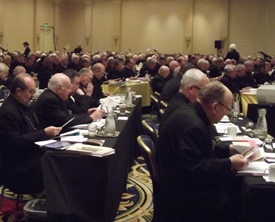Conversion of Heart
Editorial

The U.S. bishops gathered for their annual mid-November meeting in Baltimore (see page 1 story U.S. Bishops Reject Economic Statement) just a week after a national election upended hopes that the democratic process would resolve concerns about the federal contraception mandate and the slow, steady advance of same-sex "marriage."
A Washington Post headline described the bishops as "chastened," a double-edged term suggesting that the nation’s Catholic shepherds experienced a "correction" — or possibly a "purification."
Correction? Some critics of the bishops — in politics and in the pews — have asserted that they improperly allowed their message to be politicized and then our shepherds lost credibility after they failed to gain traction with Catholic voters.
According to this line of argument, the bishops were punished for raising questions about the policies of a popular presidential candidate and must now do penance by suffering in silence, awaiting a future reprieve, if the state so deigns.
Purification? In a Nov. 12 address before his brother bishops, Cardinal Timothy Dolan of New York, the president of the U.S. Conference of Catholic Bishops, signaled that he did indeed view the post-election period as an opportunity for spiritual renewal for Church leaders and the faithful.
However, the cardinal did not suggest that his invitation to conversion in Christ signaled a belief that the Church had failed to keep pace with the times. Rather, that purification was always needed — especially during times of trial and struggle, when playing offense can become a personal agenda and a matter of pride.
At such times, the "refiner’s fire" is needed to discern the work of the Holy Spirit and to make sure that whatever we are fighting for is worth the battle.
"Yes, we have a lot on our plate," Cardinal Dolan observed in his opening remarks that touched on the destruction wreaked by Hurricane Sandy, the demands posed by the New Evangelization and "our continued dialogue, engagement and prophetic challenge to our culture."
But he did not linger on setbacks. Instead, he offered a passionate message of personal conversion through Christ.
"We cannot engage culture unless we let him first engage us; we cannot dialogue with others unless we first dialogue with him; we cannot challenge unless we first let him challenge us."
The past year’s challenges at the intersection of faith and the political life of our country understandably led many Catholics to focus on external threats to religious freedom and the long-term survival of church-affiliated institutions.
Now, while political commentators and politicians look for guidance from exit polls, Church leaders are invited to receive the grace of this moment to grow in humility and zeal for the work of purification of souls.
The bishops have indeed been humbled by a high-stakes election year that exposed the continuing decline of Catholic moral and social teaching and widespread confusion among the faithful about who speaks for the Church on these matters.
Cardinal Dolan implicitly acknowledged this point when he recalled how many Church leaders believed that the Second Vatican Council marked a new era of global transformation but discounted the truth that the faith is spread through Christian witness, the fruit of a tireless personal engagement with Christ.
"We became very good in the years following the Council in calling for the reform of structures, systems, institutions and people other than ourselves," he said in his address to his brother bishops. "That, too, is important; it can transform our society and world. But did we fail along the way to realize that in no way can the New Evangelization be reduced to a program, a process or a call to structural reform — that it is first and foremost a deeply personal conversion within? ‘The Kingdom of God is within,’ as Jesus taught."
Penance, said Cardinal Dolan, not recriminations directed at political opponents or poorly catechized co-religionists, provides the surest foundation for a renewed Church that can meet the challenges ahead with prudence, courage and fortitude.
Indeed, during a Nov. 4 address delivered at the University of Notre Dame, Archbishop Carlo Maria Viganò, the papal nuncio to the United States, suggested that U.S. Catholics must share responsibility for the emerging threat to the free exercise of religion in this nation. (See related story Papal Nuncio: Catholic Division Undermines Religious Freedom.) This "menace," he said, was advanced, in part, through the willing facilitation of self-identified Catholic academics and commentators who have dismissed concerns about government policies that threaten religious liberty.
"There is a divisive strategy at work here, an intentional dividing of the Church; through this strategy, the body of the Church is weakened, and, thus, the Church can be more easily persecuted," the nuncio stated. The remedy he called for is a "firmness of conviction of our faith" and communion with Christ through the successors of his apostles and his vicar.
The Church in this land has rightly prided itself on its storied legacy — the many schools, universities, social agencies and hospitals that have served the needy for generations. Now is not the time for pride, but for penance — and for careful discernment by those charged with reviving the Catholic identify of our institutions.
What we love is never more precious than when it is under threat. And a decade hence, we pray that our beloved institutions will still witness to our faith by serving the marginalized and educating a new generation of Catholics.
But as our Church enters this period of conversion and repentance, let the wisdom of the Holy Spirit also guide a renewal of Catholic education, charities and health care.
If we are to fight for their survival, let them be truly Catholic.













